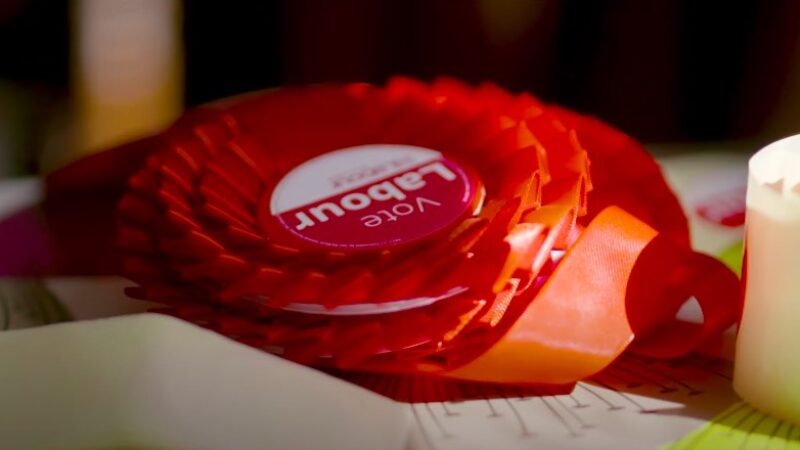
Left candidates in the elections for Labour’s national executive committee have secured the strongest show of support from local parties, with all left slate candidates for member representative posts receiving at least 240 nominations each.
The deadline for Constituency Labour Parties (CLPs) to nominate candidates hoping to be elected to the 18 seats up for grabs on the NEC closed at midnight on Sunday, September 27th in the contest set to end in November.
Laura Pidcock received the most nominations of all contenders, with 333 CLPs backing the former MP. She belonged to the Centre-Left Grassroots Alliance slate backed by Momentum, which did best in the nomination stage of the race.
But the candidate who secured the second highest number of nominations in the race, with 301 CLPs, was former NEC member Ann Black. She was endorsed by soft-left group Open Labour. Its other candidate, Jermain Jackman, was backed by 131 CLPs.
Of local party rep hopefuls on the slate promoted by Labour to Win, a group strongly supportive of Keir Starmer, current NEC member Johanna Baxter secured the most of any on the slate, with 223 CLP nominations.
Labour First’s Luke Akehurst has tweeted that this represents the first time “since at least 2006” all candidates on the “moderate” slate have won over 100 nominations, and said the left “always gets more nominations… as they control an array of small CLPs”.
Of all Labour members who put themselves forward for CLP rep, nine received the backing of 200 local parties or more. Of those, the CLGA supported six candidates, Labour to Win backed two and soft-left group Open Labour one.
A Campaign for Labour Party Democracy spokesperson described the results as “very good” and said the nominations show “there is mainstream support amongst Labour members for defending a socialist policy agenda and democratic rights for members”.
The three candidates on the Tribune group of MPs slate were competitive, but Theresa Griffin and Paula Sherriff gained many more nominations than Liz McInnes. This was likely due to Labour to Win lending its support to Griffin and Sherriff but not McInnes.
The Labour left has had an impressive showing, yet the CLGA candidates cannot sweep the board in the final vote as they have done in past NEC elections because the voting system changed this year from first-past-the-post (FPTP) to single transferable vote (STV).
The switch to STV led the main two factional slates to be reduced from nine candidates – enough to fill all available local party rep posts – to just six. STV requires factions to maximise first-preference votes for their favoured candidates.
Just two candidates seeking to become NEC youth representative secured places on the ballot. Left-wing incumbent Lara McNeill did best, picking up two big affiliated unions – Unite and GMB – and slightly more young member nominations.
Youth rep candidate Kira Lewis, McNeill’s sole opponent, won the support of large affiliated union UNISON, as well as Community, Usdaw and a number of socialist societies including the Jewish Labour Movement.
The newly created role of disabled rep saw 11 members secure places on the final ballot. Ellen Morrison gained most support with the backing of 206 CLPs, and George Lindars-Hammond followed with nominations from 64.
Both the youth and disabled reps are elected via an electoral college: youth rep is 50% OMOV of young members and 50% affiliated trade unions; disabled rep is 50% OMOV of self-identified disabled members and 50% affiliated unions.
In the NEC Welsh rep race, incumbent Mick Antoniw won the backing of 19 Welsh CLPs and received more affiliate support than former First Minister Carwyn Jones who placed second. The post is elected by an OMOV ballot of Welsh party and affiliate members.
Both the incumbents for the two local government positions on the ruling body secured the most support in their contest, with soft-left councillor Alice Perry and LGA Labour leader Nick Forbes each being backed by 71 Labour groups.
Incumbent Diana Holland was by far the most successful candidate in the treasurer contest. The assistant general secretary of Unite, who has held the Labour NEC post for the past ten years, received 242 nominations.
Ballots dispatch begins from October 19th, with voting closing on November 12th at noon. The result will be announced on November 13th. LabourList has put together a complete guide to the Labour NEC elections work.
Below is the full list of candidates who have secured a place on the final ballot for each role.
CLP representative:
AKEHURST Luke
AMIN Bodrul
ANDERSON Dave
BAXTER Johanna
BAYANU Ekua
BEVERLEY Alex
BLACK Ann
BLAKEMORE Matthew
BOLTON Gemma
DAR Yasmine
DENT Fiona
FLINTOFF Crispin
FOY Katherine
GRIFFIN Theresa
HENDERSON Ann
IQBAL Qamer Chaudhry
JACKMAN Jermain
JAMA Nadia
JOHNSTON Mick
JOSAN Gurinder Singh
MAGGS Steve
MAPLE Vince
MCDONALD Mark
MCINNES Liz
MITCHELL Cameron
NOORI Zahida Abbas
PATIL Neeraj
PAUL Terry
PAYNE Michael
PIDCOCK Laura
PRICE Alec
RAHMAN Mish
REID Julie
SHERRIFF Paula
SHUTTLEWORTH Stephanie
SILVERMAN Roger
TATLER Shama
TAYLOR-SPEDDING Carol
VAUGHAN Julian
WHEATLEY Joseph
WISEMAN John
WOOLEY Iram
Local government representative:
BIRD Jo
FORBES Nick
PERRY Alice
WHITE Matt
Treasurer:
BRADNEY Dave
CHAUDRY Jalal
COTTERILL Reg
GILES Esther
HOLLAND Diana
LO Vincent
MORRISON Nicola
REHAL Frances
Youth representative:
LEWIS Kira
MCNEILL Lara
Disabled members representative:
BAKER George
BIRD Geraldine
BROTHERS Emily
CRACKNELL Kelvin
FOWLER Kendrick
KHAN Shebul
LINDARS-HAMMOND George
MORRISON Ellen
OKOKON Liz
PEBERBY Mary
WATTS Kevin
Welsh representative:
ANTONIW Mick
JONES Carwyn




More from LabourList
Nudification apps facilitate digital sexual assault – and they should be banned
Diane Abbott suspended from Labour after defending racism comments
Labour campaign groups join forces to call for reinstatement of MPs